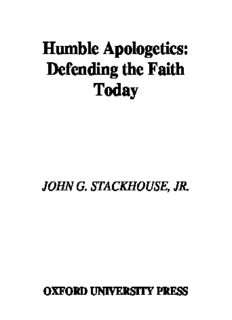
Humble Apologetics: Defending the Faith Today PDF
Preview Humble Apologetics: Defending the Faith Today
Humble Apologetics: Defending the Faith Today JOHN G. STACKHOUSE, JR. OXFORD UNIVERSITY PRESS Humble Apologetics This page intentionally left blank HUMBLE APOLOGETICS Defending the Faith Today J G. S , J . OHN TACKHOUSE R 2002 Oxford New York Auckland Bangkok Buenos Aires Cape Town Chennai Dar es Salaam Delhi Hong Kong Instanbul Karachi Kolkata Kuala Lumpur Madrid Melbourne Mexico City Mumbai Nairobi São Paulo Shanghai Singapore Taipei Tokyo Toronto Copyright © 2002 by John G. Stackhouse, Jr. Published by Oxford University Press, Inc. 198 Madison Avenue, New York, New York, 10016 www.oup.com Oxford is a registered trademark of Oxford University Press All rights reserved. No part of this publication may be reproduced, stored in a retrieval system, or transmitted, in any form or by any means electronic, mechanical, photocopying, recording, or otherwise, without the prior permission of Oxford University Press. Library of Congress Cataloging-in-Publication Data Stackhouse, John Gordon. Humble apologetics : defending the faith today / John G. Stackhouse, Jr. p. cm. Includes bibliographical references and index. ISBN 0-19-513807-4 1. Apologetics. I. Title. BT1103.S73 2002 230—dc21 2002008382 1 3 5 7 9 10 8 6 4 2 Printed in the United States of America on acid-free paper To Trevor, Joshua, and Devon This page intentionally left blank Contents Acknowledgments ix Introduction xi PART ONE: CHALLENGES 1. Pluralism 3 2. Postmodernity and Postmodernism(s) 22 3. The Problem of Plausibility 38 4. Consumerism 54 PART TWO: CONVERSION 5. Defining Conversion 67 6. Deciding about Religion 86 7. Defining, Directing, and Defending Apologetics 114 PART THREE: COMMUNICATION 8. Principles of Christian Communication 131 9. Audience-Specific Apologetics 145 10. Guidelines for Apologetic Conversation 161 11. Other Modes of Apologetics 206 Conclusion: Humble Apologetics 227 Notes 233 Index 259 This page intentionally left blank Acknowledgments I have been thinking about apologetics for almost 30 years. Over that time, I have accumulated intellectual debts far too numerous to record or even, alas, remember. I have acknowledged several of these debts in the text that follows. Several more, however, deserve mention here. Among authors, I am chiefly indebted to C. S. Lewis, the twentieth century’s most popular apologist. After discovering Lewis in my teens, I flattered myself briefly (I am ashamed to say) that I had “gotten beyond him” in graduate school. Returning to his work once I be- came a professor, I have found over the successive years endless riches in his thought and expression. Lewis isn’t right about everything, of course. But he is right about so many things, and suggestive about so many more, that I have found him an inexhaustible resource. Os Guinness inspired and informed me about how to engage in apologetics in a mode other than the typical evangelical style that was all I knew as a youth—namely, what I call “apologetics as martial arts.” Ever since meeting him as an impressionable undergraduate, I have been grateful for the impress of Os’s brilliant writing and speak- ing. I trust he will forgive me for failing to recall the source of each of the many ideas I first received from him somewhere along the way. The so-called Reformed epistemologists, especially Alvin Plan- tinga and Nicholas Wolterstorff, have shaped my general views of thinking, and thus my particular views of apologetics, in fundamen- tal ways. I am the more grateful to Nick for originally recommend- ing this project to Oxford, and then generously agreeing to read and comment on the manuscript. ix
Description: